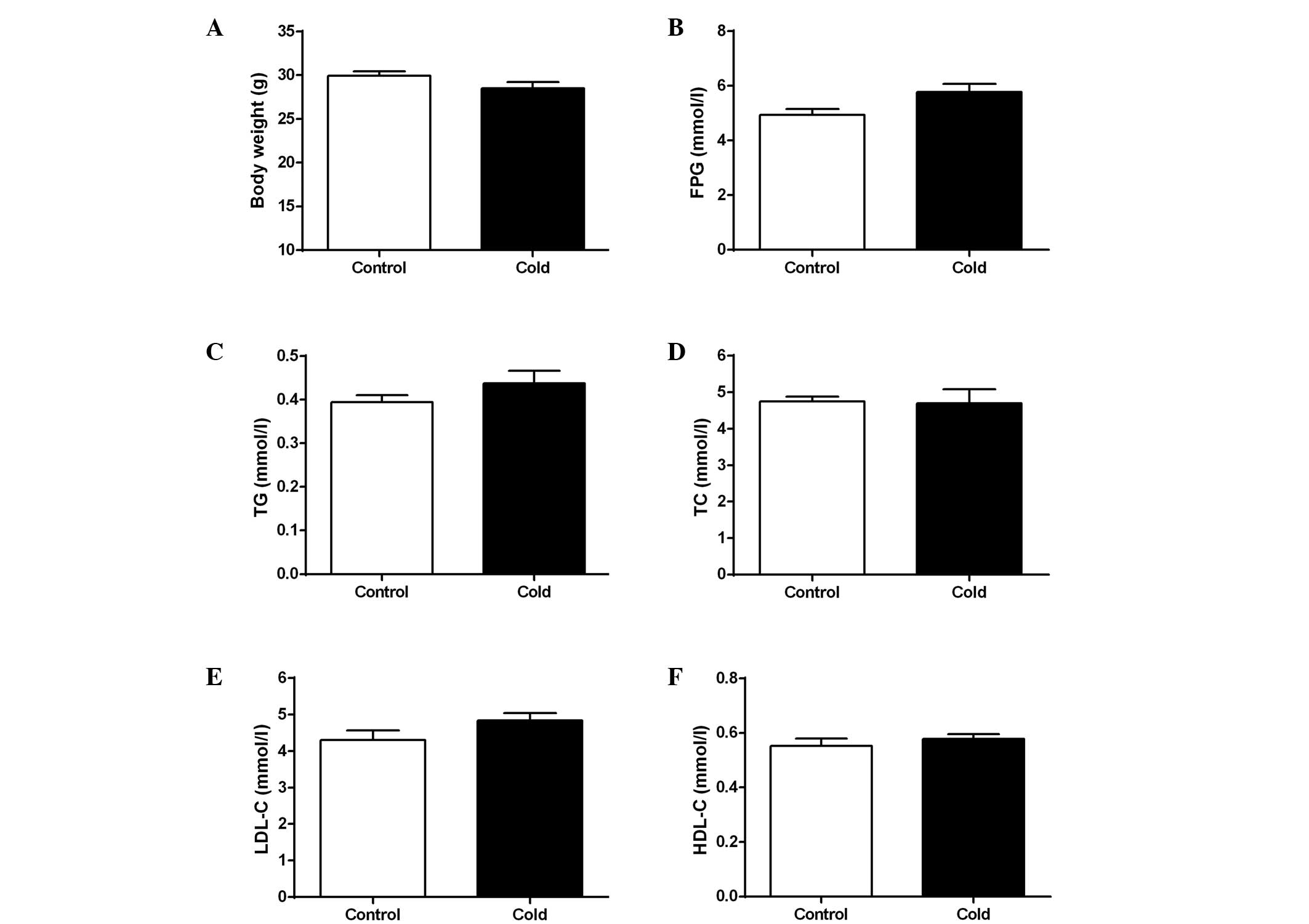|
1
|
Bi Y, Gao R, Patel A, et al:
Evidence-based medication use among Chinese patients with acute
coronary syndromes at the time of hospital discharge and 1 year
after hospitalization: results from the Clinical Pathways for Acute
Coronary Syndromes in China (CPACS) study. Am Heart J. 157:509–516.
2009.
|
|
2
|
Bhaskaran K, Hajat S, Haines A, Herrett E,
Wilkinson P and Smeeth L: Effects of ambient temperature on the
incidence of myocardial infarction. Heart. 95:1760–1769. 2009.
View Article : Google Scholar : PubMed/NCBI
|
|
3
|
Barnett AG, Dobson AJ, McElduff P, et al:
Cold periods and coronary events: an analysis of populations
worldwide. J Epidemiol Community Health. 59:551–557. 2005.
View Article : Google Scholar : PubMed/NCBI
|
|
4
|
De Lorenzo F, Sharma V, Scully M and
Kakkar VV: Cold adaptation and the seasonal distribution of acute
myocardial infarction. QJM. 92:747–751. 1999.PubMed/NCBI
|
|
5
|
Dilaveris P, Synetos A, Giannopoulos G,
Gialafos E, Pantazis A and Stefanadis C: Climate impacts on
myocardial infarction deaths in the Athens territory: the CLIMATE
study. Heart. 92:1747–1751. 2006. View Article : Google Scholar : PubMed/NCBI
|
|
6
|
Guo Y, Li S, Zhang Y, et al: Extremely
cold and hot temperatures increase the risk of ischaemic heart
disease mortality: epidemiological evidence from China. Heart.
99:195–203. 2013. View Article : Google Scholar
|
|
7
|
Arbab-Zadeh A, Nakano M, Virmani R and
Fuster V: Acute coronary events. Circulation. 125:1147–1156. 2012.
View Article : Google Scholar
|
|
8
|
Li F, Gao Z, Xu D, Jing J and Wang J:
Effect of cold and dry environment on the expression of matrix
metalloproteinase 1 mRNA in bone tissues of different pathogenic
factors induced models. Zhongguo Zuzhi Gongcheng Yanjiu.
16:9414–9418. 2012.
|
|
9
|
Kawai N, Kawanishi M, Okada M, Matsumoto Y
and Nagao S: Treatment of cold injury-induced brain edema with a
nonspecific matrix metalloproteinase inhibitor MMI270 in rats. J
Neurotrauma. 20:649–657. 2003. View Article : Google Scholar
|
|
10
|
Hori T, Uemoto S, Hata T, et al: Matrix
metalloproteinase-9 after the cold ischemia/reperfusion injury
and/or shear stress with portal hypertension: an overview. Surg
Today. 44:201–203. 2013. View Article : Google Scholar : PubMed/NCBI
|
|
11
|
Upadhya AG, Harvey RP, Howard TK, Lowell
JA, Shenoy S and Strasberg SM: Evidence of a role for matrix
metalloproteinases in cold preservation injury of the liver in
humans and in the rat. Hepatology. 26:922–928. 1997. View Article : Google Scholar : PubMed/NCBI
|
|
12
|
Li C, Li X, Shen Q, et al: Critical role
of matrix metalloproteinase-9 in acute cold exposure-induced stroke
in renovascular hypertensive rats. J Stroke Cerebrovasc Dis.
28:e477–e485. 2013. View Article : Google Scholar : PubMed/NCBI
|
|
13
|
Jiang S, Jin F, Li D, et al: Intermittent
hypobaric hypoxia promotes atherosclerotic plaque instability in
ApoE-deficient mice. High Alt Med Biol. 14:175–180. 2013.
View Article : Google Scholar : PubMed/NCBI
|
|
14
|
Ma S, Yang D, Li D, Tang B and Yang Y:
Oleic acid induces smooth muscle foam cell formation and enhances
atherosclerotic lesion development via CD36. Lipids Health Dis.
10:532011. View Article : Google Scholar : PubMed/NCBI
|
|
15
|
Jin F, Jiang S, Yang D, et al: Acipimox
attenuates atherosclerosis and enhances plaque stability in
ApoE-deficient mice fed a palmitate-rich diet. Biochem Biophys Res
Commun. 428:86–92. 2012. View Article : Google Scholar : PubMed/NCBI
|
|
16
|
Li D, Ma S, Yang Y, et al: BTEB2 knockdown
suppresses neointimal hyperplasia in a rat artery balloon injury
model. Mol Med Rep. 4:413–417. 2011.PubMed/NCBI
|
|
17
|
Ma S, Yang D, Li D, Tang B, Sun M and Yang
Y: Cardiac extracellular matrix tenascin-C deposition during
fibronectin degradation. Biochem Biophys Res Commun. 409:321–327.
2011. View Article : Google Scholar : PubMed/NCBI
|
|
18
|
Kozyreva TV, Lomakina SV, Tuzikov FV and
Tuzikova NA: Plasma lipoproteins under the effect of cold exposure
in normotensive and hypertensive rats. J Therm Biol. 29:67–72.
2004. View Article : Google Scholar
|
|
19
|
Dong M, Yang X, Lim S, et al: Cold
exposure promotes atherosclerotic plaque growth and instability via
UCP1-dependent lipolysis. Cell Metab. 18:118–129. 2013. View Article : Google Scholar : PubMed/NCBI
|
|
20
|
Hintsala H, Kandelberg A, Herzig KH, et
al: Central aortic blood pressure of hypertensive men during
short-term cold exposure. Am J Hypertens. Aug 20–2013.(Epub ahead
of print).
|
|
21
|
Modesti PA: Season, temperature and blood
pressure: A complex interaction. Eur J Intern Med. 24:604–607.
2013. View Article : Google Scholar : PubMed/NCBI
|
|
22
|
Sapienza P, di Marzo L, Borrelli V, et al:
Metalloproteinases and their inhibitors are markers of plaque
instability. Surgery. 137:355–363. 2005. View Article : Google Scholar : PubMed/NCBI
|
|
23
|
Shah PK and Galis ZS: Matrix
metalloproteinase hypothesis of plaque rupture: players keep piling
up but questions remain. Circulation. 104:1878–1880. 2001.
|
|
24
|
Johnson JL, Fritsche-Danielson R, Behrendt
M, et al: Effect of broad-spectrum matrix metalloproteinase
inhibition on atherosclerotic plaque stability. Cardiovasc Res.
71:586–595. 2006. View Article : Google Scholar : PubMed/NCBI
|
|
25
|
Xie S, Nie R and Wang J: Inhibiting
extracellular matrix metalloproteinase inducer maybe beneficial for
diminishing the atherosclerotic plaque instability. J Postgrad Med.
55:284–286. 2009. View Article : Google Scholar
|
|
26
|
Smeglin A and Frishman WH: Elastinolytic
matrix metalloproteinases and their inhibitors as therapeutic
targets in atherosclerotic plaque instability. Cardiol Rev.
12:141–150. 2004. View Article : Google Scholar : PubMed/NCBI
|
|
27
|
Loftus IM, Naylor AR, Bell PR and Thompson
MM: Matrix metalloproteinases and atherosclerotic plaque
instability. Br J Surg. 89:680–694. 2002. View Article : Google Scholar : PubMed/NCBI
|


















